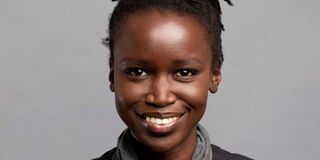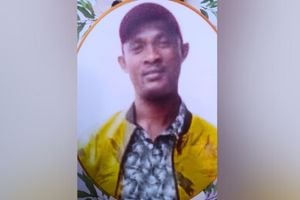T5 interview with Akuol de Mabior

What you need to know:
- My mother inspired me to make the film. When we started filming, we didn’t know that she would become one of our country’s five vice presidents.
- With documentaries, planning is essential, but ultimately you don’t know what will happen, and reality is the best storyteller.
- The developments changed the film. It became less about looking back and more about embracing the present.
- Responsibility or duty to country and family is a big theme in the film.
Akuol de Mabior is a South Sudanese filmmaker based in Nairobi. No Simple Way Home, her feature directorial debut, became the first South Sudanese film to premiere at the Berlin International Film Festival
1. Your track record looks amazing. What are some of the challenges you faced in making your five productions?
My track record is still short, which partly explains the challenge. It can take a long time to get a documentary film off the ground. It also takes a long time to complete it and a lot of effort to keep the momentum going throughout the process. You get a lot of, “Are you still making that film?” Film directors and producers have to start the engine and keep it running, or come back to jump-start things when they go off track. It is also a massive exercise in faith and confidence, because you can never be sure how people will receive it once it’s done.
Three of the five productions were short films I made while at the University of Cape Town. The most notable one is Fall into the Sky (2019), an experimental short documentary about colourism, afrophobia and xenophobia from the perspectives of women of colour in a South African context. It screened at the Zeitz Museum of Contemporary Art Africa, the Encounters South African International Documentary Film Festival, and the Durban International Film Festival.
White Nile, which aired on Al Jazeera last November, is about Rebecca Lith Chol, who, at 35, is a mother of six, breadwinner and captain of her own ship. She sails it down the Nile all the way up to Bentiu close to the Sudanese border. She is a remarkable woman. When I received the opportunity to pitch an idea for a short documentary, I knew I wanted to focus on South Sudanese women breadwinners. I want to focus on people who are finding a way forward against great odds. What we’re accustomed to hearing and seeing from South Sudan is the turmoil, chaos, and problems, but it’s not the whole story.
2. What inspired you to make No Simple Way Home?
That is a documentary about family, country, and our struggle to reconcile the personal and political. My father, John Garang de Mabior, founded and spearheaded the Sudan People’s Liberation Movement (SPLM) in 1983, with my mother Rebecca by his side. He was killed before he could complete his mission. My mother is now struggling to ensure that his life and those of millions of South Sudanese people were not lost in vain.
My mother inspired me to make the film. When we started filming, we didn’t know that she would become one of our country’s five vice presidents. With documentaries, planning is essential, but ultimately you don’t know what will happen, and reality is the best storyteller. The developments changed the film. It became less about looking back and more about embracing the present.
Responsibility or duty to country and family is a big theme in the film.
3. Why do you think African filmmaking has been disadvantaged for so long?
There have been obvious seismic shifts in the entire media landscape recently. These shifts have created greater access to filmmaking and content creation tools and new forms of exhibition and distribution, as well as a diminishing need for gatekeepers.
The African documentary space, in particular, has grown rapidly with ground-breaking work by incredible filmmakers. Companies like Netflix are starting to recognise the potential for African stories to move people and generate value, which is great.
4. How do you think recognition impacts the kind of films Africans make?
I think working to gain recognition at home rather than expecting it for free is part of valuing African audiences. I wouldn’t, for example, set up a business and expect customers to show up just because we’re both South Sudanese, East African, African, Black, and so forth. I think it’s important to earn recognition from our compatriots and neighbours. Part of this work involves exploring what people are willing to pay for. It is possible to ask, test, research, and of course, this takes resources, but I think it’s worth it and necessary if we really value African audiences.
5. Who would you like to collaborate with, film-wise?
The South Sudanese film and media space is fledgling, of course — we’re a young country. But with the two films, No Simple Way Home and On the White Nile, I’ve already received many collaboration requests from my compatriots, and I can’t wait to explore those opportunities. Things take time, but watch this space.





